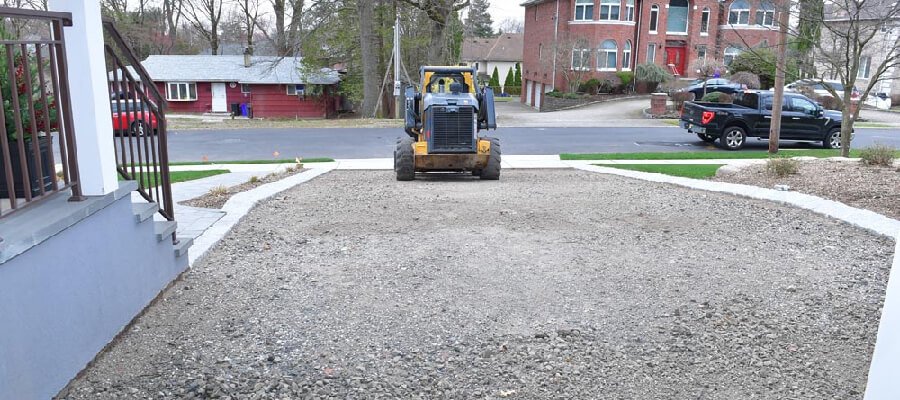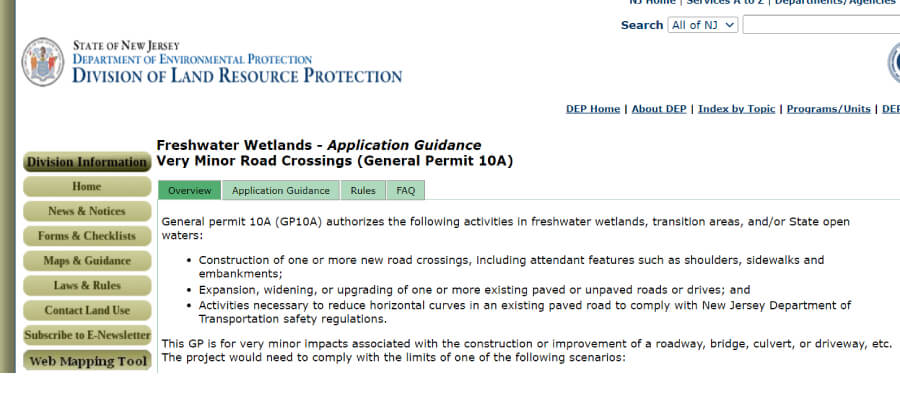In road and driveway construction, strict regulations exist to safeguard particular areas, such as wetlands, coastal regions, and floodplains. N.V.N. Paving, a New Jersey-based company, adheres to these guidelines and obtains the necessary permits depending on each project’s specifics.
To ascertain the presence of unique areas within a project site, one can utilize the NJ-GeoWeb online mapping service. Examining these areas before commencing any project is crucial, as they can influence the type of permit required.
Various permits and regulations cater to different project types. For instance, when a project impacts bodies of water like streams, rivers, lakes, and ponds, adherence to the “Flood Hazard” regulations is mandatory. Moreover, if a project affects coastal areas, the “Coastal” laws must be followed, and for impacts on freshwater wetlands, the “Freshwater Wetlands” guidelines apply. Further information on Tidelands can be found under the “Tidelands” tab.
Road and driveway construction typically necessitates a formal permit, although specific projects might qualify for a Permit by Rule (P.B.R.) if conditions are met. If a project does not meet these conditions, an Individual Permit is required.
Road and driveway construction, repair, or reconstruction in coastal areas may qualify for exemptions, P.B.R.s, or General Permits. If a proposed project does not meet the requirements for these authorizations, C.A.F.R.A., Coastal Wetlands, and Waterfront Development Individual Permits may be necessary. The jurisdiction tab of the “Coastal Areas” webpage helps determine which areas of a site may be regulated, and permit availability depends on the project’s location.
It is imperative for contractors, such as N.V.N. Paving in New Jersey, to adhere to these regulations and obtain the appropriate permits before undertaking any road or driveway construction, repair, or reconstruction projects. This ensures compliance with local and state laws and safeguards the environment and natural resources from potential harm.
Understanding Special Area Regulations for Road and Driveway Construction in New Jersey
The Permit Landscape: Navigating the Regulatory Maze
In road and driveway construction, strict regulations exist to safeguard particular areas such as wetlands, coastal regions, and floodplains. N.V.N. Paving, a New Jersey-based company, adheres to these guidelines and obtains the necessary permits depending on each project’s specifics.
- Flood Hazard Regulations: Projects impacting bodies of water like streams, rivers, lakes, and ponds must adhere to these regulations.
- Coastal Regulations: Projects affecting coastal areas must follow these guidelines.
- Freshwater Wetlands Regulations: Projects impacting freshwater wetlands must comply with these regulations.
- Tidelands Regulations: Information on Tidelands can be found under the “Tidelands” tab.
Permit Requirements and the Permit by Rule (P.B.R.) Pathway
Road and driveway construction typically necessitates a formal permit. However, specific projects might qualify for a Permit by Rule (P.B.R.) if particular conditions are met. If a project does not meet these conditions, an Individual Permit is required.
John Smith, a representative from N.V.N. Paving, explains, “Our team carefully assesses each project to determine whether it qualifies for a Permit by Rule or if an Individual Permit is necessary.”
Coastal Area Permits: Exemptions, P.B.R.s, and General Permits
Road and driveway construction, repair, or reconstruction in coastal areas may qualify for exemptions, P.B.R.s, or General Permits. If a proposed project does not meet the requirements for these authorizations, C.A.F.R.A., Coastal Wetlands, and Waterfront Development Individual Permits may be necessary.
The jurisdiction tab of the “Coastal Areas” webpage helps determine which areas of a site may be regulated, and permit availability depends on the project’s location.
- Exemptions: Applicable to specific projects that meet certain criteria, such as reconstructing a legally existing driveway within C.A.F.R.A. jurisdiction.
- Permits-by-rule (P.B.R.s): Apply to projects such as developing a single-family home or duplex and accessory development (garages, sheds, pools, driveways) on a bulkheaded lagoon lot.
- General Permits: These permits are relevant for a broader range of projects without exemption or P.B.R. criteria.

The Importance of Adherence to Regulations and Obtaining Appropriate Permits
It is imperative for contractors, such as N.V.N. Paving in New Jersey, to adhere to these regulations and obtain the appropriate permits before undertaking any road or driveway construction, repair, or reconstruction projects. This ensures compliance with local and state laws and safeguards the environment and natural resources from potential harm.
Bryan W., a local environmental advocate, emphasizes, “The permit process is crucial in protecting our special areas, and companies like N.V.N. Paving play a vital role in ensuring that construction projects adhere to these guidelines.”
In summary, understanding and adhering to permit requirements for road and driveway construction in New Jersey is crucial for contractors like N.V.N. Paving. By doing so, they ensure compliance with regulations and help protect the environment and natural resources for future generations.

General Permit 10A
The New Jersey Administrative Code (N.J.A.C. 7:7A-5.10A) specifically pertains to minor road crossings that impact freshwater wetlands and State open waters. This permit is applicable when a road or driveway project falls under one of two specific scenarios:
1. Short Crossing Scenario
Under the Short Crossing Scenario, a project must meet the following requirements:
- The disturbance of freshwater wetlands or State open waters does not exceed 100 feet in length for each crossing.
- The total cumulative disturbance of freshwater wetlands, transition areas, and State open waters is limited to a one-quarter acre or less.
These constraints ensure that any construction project under the Short Crossing Scenario has a minimal environmental impact and preserves the integrity of freshwater wetlands and State open waters.
2. Long Crossing Scenario
The Long Crossing Scenario offers an alternative set of requirements for projects that do not have a specified crossing length. In this case, the following conditions must be met:
- There is no set crossing length requirement.
- The total cumulative disturbance of freshwater wetlands, transition areas, and State open waters cannot exceed one-eighth acre.
This scenario allows for more flexibility in crossing length but limits the total disturbance area to minimize potential environmental harm.
Why General Permit 10A Matters
General Permit 10A is critical in balancing development needs with protecting New Jersey’s freshwater wetlands and State open waters. By adhering to the requirements outlined in either the Short Crossing Scenario or the Long Crossing Scenario, contractors can ensure that their road or driveway projects comply with state regulations and minimize any negative environmental impact.
In conclusion, understanding and adhering to the requirements of General Permit 10A for minor road crossings in New Jersey is essential for contractors and developers. Following these guidelines can help protect the state’s valuable freshwater wetlands and State open waters while still carrying out necessary construction projects.


